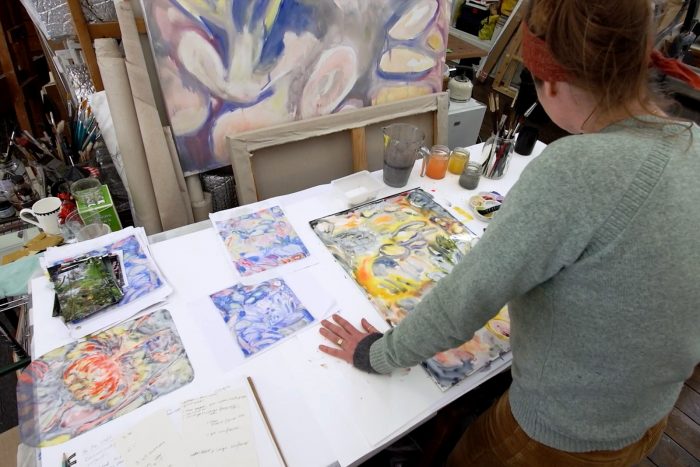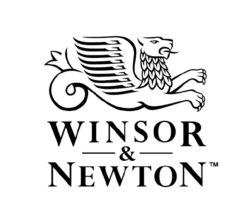“The Moment When” with Tamsin Relly
May 9, 2022What are the moments that have and continue to inspire Tamsin Relly on her creative journey?
Originally from South Africa, Tamsin Relly is a visual artist who has been living and working in London for the past 10 years.
Tamsin’s work has spanned an eclectic spectrum of different expressions and media – from painting and printmaking to writing and photography.
The team at Winsor & Newton visited Tamsin in her studio to hear how different moments have and continue to influence and impact her unique watercolour journey. Watch the full interview below.
On Work & Studio Life
What does a typical day in the studio look like for you?
On a dream studio day – which can feel rare sometimes between other commitments around managing an art practice – I take a slow walk down via the park for a coffee and to give my dog a run. I usually potter around for a while once I’m in, and prepare the space before getting on to any making.
I’ve started a new ritual I call ‘An Offering for the Muses’, where I select an image of an artwork, some text or a poem, a photo, an art material, an object from nature, and something to listen to – music or a podcast.
I choose quickly and intuitively from things that don’t necessarily have to do with current projects and lay them out…as an offering to the creative pot and to invite a moment to engage with the books and practices that interest and inspire me, but can too easily sit untouched.
What are your biggest inspirations or influences that have shaped your practice?
In recent years I have been drawn to respond to the ecological crises of our time, our role in that and how we relate to what is unfolding environmentally through day to day life. I’ve been exploring ideas around how we find connection with our living world, and how we can move towards living in reciprocity with Nature, remembering that we are a part of it.

On Watercolour Paints & Techniques
What was the moment when you tried watercolours for the first time?
I tried watercolours for the first time when I was growing up as my parents used to paint with them. We used to wet the paper beforehand so the pigments would bleed into soft spongey pools. I remember the sense of magic around how those sticky little blocks in the pan, could release so much luminous colour.
What are the qualities you look for when choosing watercolours?
I lean towards more transparent colours as I like the way these lend themselves to working in layers. But I do enjoy the earthiness of opaque tones which offer a different quality. I use watercolours mostly for printmaking or working large scale – both of which benefit from a generous palette, so I tend to rely on tubes and where possible those with a high pigment content.
Do you have any unique techniques you are happy to share?
I like to work on tough cotton paper, in quite loose, fluid layers – which I find allows the pigment to pool in crisp and interesting ways.
Aside from working with watercolours direct to paper, I use them for monotypes, which are unique prints. In this process, I paint onto a clear acetate-like plate, leave it to dry and then run it through a press transferring the image onto damp paper.
I work with the paint quite wet so a lot can change as it’s drying, and the image comes out in reverse. I enjoy the fluidity of this process – you never quite know what you’re going to get until it comes off the press.
How long have you been using Winsor & Newton watercolours, and what do you like about them?
I have been using Winsor & Newton Artists’ Oil Colour and Artisan Water Mixable Oil Colour for as long as I can remember. More recently I’ve started using Winsor & Newton Professional Watercolours. They come in an extraordinary range of colours which are rich in pigment.
If you could give one piece of advice to someone trying watercolours for the first time, what would it be?
My advice for someone new to watercolour would be to think about the marks like pieces of stained glass, that you can build up in translucent layers of colour.
And if you have the means, to experiment with different paper surfaces until you find one that you feel works well for your mark. It was like this for me, certain surfaces lend themselves to the type of mark I make, whilst for others nothing I can do works!
On Inspiration & Advice
What is the best piece of advice you were ever given by another artist?
I love what the art critic Jerry Saltz writes in his book How to be an Artist – ‘Nothing happens when you’re not working. But anything can happen if you are’.
I always find that encouraging – the idea of just turning up to your canvas or turning up to that piece of time if you’re able to set it aside, just be there and see what can come out of that space.

Do you remember the moment when you first felt inspired or moved by a piece of art?
I used to watch my older sister painting and was always enamoured by her skills. I have a fond memory of her making a series of simple but beautiful glowing water colour squares and being so taken by them.
The moment when someone sees your work for the first time, what would you like them to think or feel?
The moment when someone sees my work for the first time, I hope that people would feel free to dream into the work in whichever way they are taken. I have all my ideas and there is a place for that – they’re important for my process and
I love the dialogue that unfolds around a body of work. But in a way a new conversation begins between the viewer and the work, and I think it’s good to leave space for that too.
What inspires you? Are there particular moments when you feel most inspired?
Right now, the moments when I feel most inspired come from just being in the studio. I’m grateful for having the space, and when I have the time to be there.
Through artist residencies and research trips, I am privileged to have been on a number of extraordinary adventures to different environments, such as the Arctic Circle or American South West. So, I have a lot to draw from.
What are the moments when you feel most challenged?
The moments when I feel most challenged in the studio – are each time I’m reminded that regardless of how many years I’ve been painting, it remains an elusive, unpredictable and mercurial medium – which is both the appeal and challenge of it. It always keeps you on your toes.
This article is presented by Winsor & Newton.
Committing to quality and innovation is a part of the rich heritage of the Winsor & Newton brand.
Shop their range of paints, paint brushes, drawing materials, and more – here.

